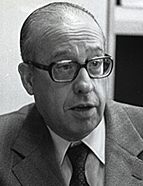

History must be a tool to understand today’s society and the perplexities of a present-day way of thinking.” Furthermore, “history represents the genetic explanation in the entirety of knowledge.” The seminal and unique A Crise da História e as suas Novas Directrizes further reveals the author’s ever-present concern with the teaching reform, which had remained archaic and compliant with outdated conceptions.
Pierre Hourcade, head of the Instituto Francês [French Institute] in Lisbon, with the initial assistance of Marcel Bataillon and Lucien Febvre and later of Fernand Braudel, hired Vitorino Magalhães Godinho as a researcher of the Centre National de la Recherche Scientifique [the French National Centre for Scientific Research], in 1947, thus allowing him to prolong his stay in Paris until 1960. His education was therefore completed amidst the broad horizons of the great masters of the École Pratique des Hautes Études. Lucien Febvre authored the preface to Magalhães Godinho’s first major work of economic history – Prix et monnaies au Portugal. 1750-1850 [Price and Money in Portugal. 1750-1850]. He became involved in seminars, wrote for the Annales, founded the Association Marc Bloch (fostering the emergence of a branch in Portugal – the Sociedade Portuguesa de História da Civilização [Portuguese Society of the History of Civilization] and remained in close contact with the masters of French historiography of those golden years. They were, indeed, fruitful years marked by the support of Lucien Febvre in the management of the 6th department of the École Pratique des Hautes Études, and again from 1956 onwards, of Fernand Braudel. At the time, Paris was the hub of progress in historical knowledge. Historians brought together in a common attitude, in non-converging works, and when viewed from a distance well worthy of the name – the Annales School - even if they themselves refused to acknowledge it. This was a major scientific endeavour, seeking to historicise all the social sciences, imbuing history with objects, theories, and methodologies from the other social sciences. It represented the fulfilment of the wishes voiced in 1929 by Marc Bloch and Lucien Febvre, which continued, albeit more imperialistically, under Fernand Braudel. Magalhães Godinho, a member “à part entière” of the group – would lecture with Maurice Lombard and Pierre Mombeig in São Paolo, and as an integral part of the French mission, in 1954 –, is worthy of special reference here not only for the oceans in his ongoing doctoral thesis but also for his concern regarding the connections and transferences of economic theory to history.
